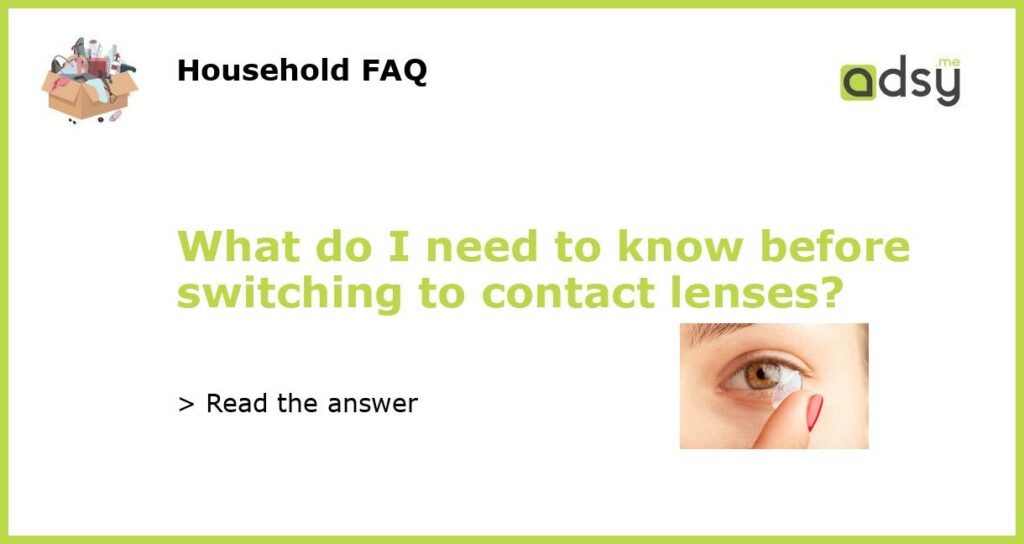Understanding the Basics of Contact Lenses
Contact lenses are a popular alternative to eyeglasses, providing clear and comfortable vision for a wide range of visual needs. However, before making the switch, it is important to understand the basics of contact lenses:
- Type: There are different types of contact lenses, such as soft, rigid gas-permeable, and hybrid lenses.
- Fitting: Contact lenses need to be fitted properly, so you should consult an eye care professional for a proper fitting.
- Care: Contact lenses require proper care and maintenance, including cleaning, disinfecting, and storing.
- Comfort: Some people may experience discomfort with contact lenses initially. However, most people adapt to them after a few days or weeks.
- Risk factors: Contact lenses carry some risk factors, such as eye infections, allergies, and irritated or dry eyes. It is important to follow proper hygiene and safety guidelines while wearing contact lenses.
Benefits of Contact Lenses
Contact lenses offer a range of benefits, such as:
- Improved vision: Contact lenses provide clear and consistent vision, without the distortion and reflection caused by eyeglass lenses.
- Convenience: Contact lenses are convenient to wear during sports, outdoor activities, and other physical activities where eyeglasses can get in the way.
- Aesthetics: Contact lenses are almost invisible, and don’t detract from your appearance or style.
- Freedom: Contact lenses enable you to move around freely and do not limit your visual field, unlike eyeglasses with frames.
Risks of Contact Lenses
While contact lenses provide a range of benefits, there are also some risks that need to be considered before making the switch. These include:
- Infection: Contact lenses can increase the risk of eye infections if not handled properly or if worn for too long.
- Discomfort: Some people may experience discomfort, blurred vision or dry eyes while wearing contact lenses, especially during the initial adjustment period.
- Allergies: Contact lenses can cause allergies for some people, leading to redness, itching, and a burning sensation in the eyes.
- Cost: Contact lenses can be more expensive than eyeglasses, especially if you opt for specialized lenses or require frequent replacements.
- Inconvenience: Contact lenses require proper care and maintenance, which can be inconvenient for some people.
Choosing the Right Type of Contact Lenses
Choosing the right type of contact lenses is crucial for achieving clear vision and comfort. Here are a few factors to consider:
- Visual needs: Your visual needs, such as the degree of refractive error, the type of correction, and the frequency of use, will determine the type of contact lenses recommended by your eye care professional.
- Lifestyle: Your lifestyle and activities will also influence your choice of contact lenses. For instance, daily contact lenses may be more suitable for people with an active lifestyle, while extended wear lenses may be preferred by those who need to wear their lenses for longer periods.
- Eye health: Your eye health is an important consideration when choosing contact lenses, especially if you have dry eyes, allergies, or other underlying conditions. In such cases, specialized lenses may be required.
Precautions and Hygiene Tips for Contact Lens Wearers
Here are some precautions and hygiene tips to follow while wearing contact lenses:
- Wash your hands thoroughly before handling your contact lenses.
- Use only sterile solutions and containers for cleaning, storing, and disinfecting your lenses.
- Replace your contact lenses and lens cases regularly as advised by your eye care professional.
- Avoid wearing contact lenses while swimming or in hot tubs.
- Seek immediate medical attention if you experience any discomfort or redness in your eyes while wearing contact lenses.






